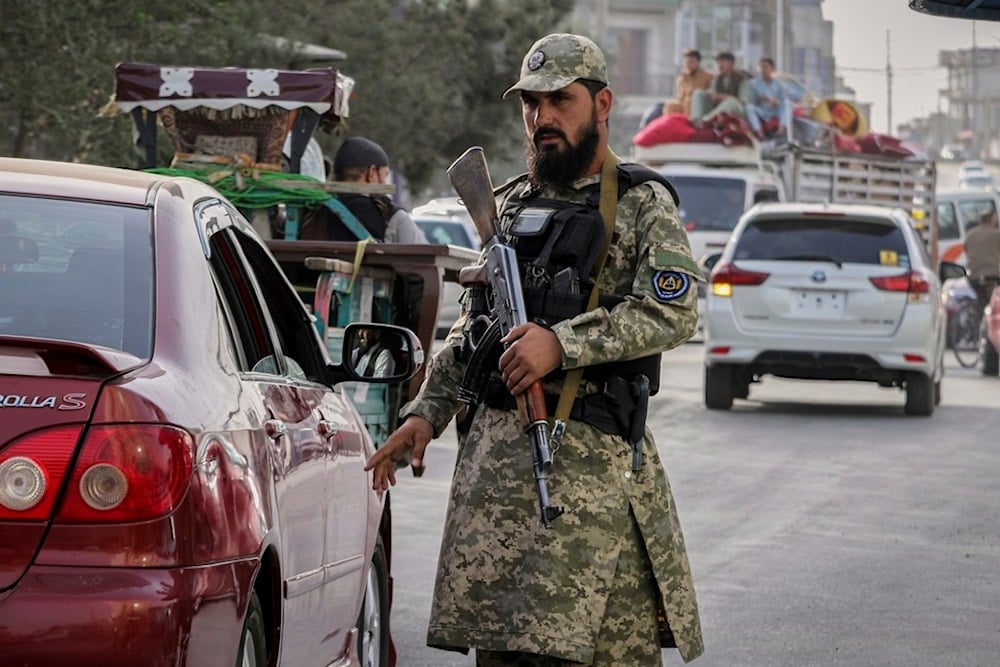Afghan Interior Ministry says ISIS completely curbed in the country
Afghanistan's Interior Ministry insisted Friday that ISIS has been "completely curbed" and no longer poses a threat inside the country, even as international experts warn the group may still exploit Afghan refugees for recruitment.
-

A Taliban policeman directs traffic on the eve of celebrations marking the fourth anniversary of the US withdrawal from Afghanistan and the start of Taliban rule, in Kabul, Afghanistan, Thursday, Aug. 14, 2025 (AP Photo/Siddiqullah Alizai)
Afghanistan's Interior Ministry declared Friday that the Islamic State group has been fully suppressed within the country, asserting that it no longer poses a major security concern.
Spokesman Abdul Matin Qane told reporters, "The subversive elements of Daesh [IS] in Afghanistan have been completely curbed, and there is no cause for concern in this regard."
He noted that IS operations in Afghanistan had always been orchestrated from abroad, stating, "It is well known that the command and control of Daesh have always been external and orchestrated from outside."
Qane admitted limited risks that militants might try to infiltrate Afghanistan disguised as migrants but stressed that border forces were vigilant: "The Islamic Emirate of Afghanistan has minor concerns that Daesh members might enter the country from neighboring countries as migrants, but our intelligence and security forces are directly monitoring the borders and will not allow this."
The comments, delivered at a meeting of ministry inspectors from all 34 provinces, came amid persistent warnings from international observers. Hans-Jakob Schindler, former coordinator for the UN committee monitoring militant groups, cautioned earlier this week that IS-Khorasan Province (IS-K) may view returning Afghan refugees as a potential pool for recruitment.
A Decade-Long Fight Against IS-K
ISIS-K's emergence in eastern Afghanistan around 2015 underscored the failures of years of foreign intervention. Drawing fighters from Pakistan's tribal belt and defectors from the Taliban, the group gained notoriety for its deliberate targeting of civilians—bombing mosques, schools, and even maternity wards in a bid to instill terror.
Attempts to eliminate it by US and NATO forces, carried out in partnership with the former Afghan government, were as spectacular as they were superficial. Successive leaders were killed, and in 2017 the US dropped the so-called "Mother of All Bombs" on Nangarhar in what was framed as a decisive blow. Yet the group endured. These highly publicized operations did little more than dent its structure temporarily, while civilian casualties and political failures created conditions that fueled further radicalization. Far from destroying ISIS-K, foreign intervention inadvertently strengthened the soil in which it thrived.
When the Taliban retook power in 2021, they positioned themselves as ISIS-K's principal enemy, staging raids and executing suspected members to showcase control. Still, the movement has proven adaptable, retaining the capacity to strike not only inside Afghanistan but also across the region, from attacks on Shi'a gatherings in Iran to massacres in Russia.
This trajectory raises uncomfortable questions: if two decades of the world's most advanced military campaign could not eradicate ISIS-K, were these efforts ever truly aimed at ending the threat—or were they a justification for entrenching Western presence in a strategically vital region? The Taliban now claim victories against ISIS-K, but the group's persistence exposes both the hollowness of past interventions and the fragility of the current order.
Read more: Intercept: US built a dependent Afghan army, setting it up for failure
Shifting Alliances
The failure of US and NATO operations to eliminate ISIS-K has left deep scars. While Western involvement disrupted the group's leadership, it also fueled resentment through civilian casualties and governance failures, providing militants with new recruitment opportunities. Today, the Taliban looks elsewhere for support.
Regional powers, namely Russia, China, Iran, and Pakistan, are forming new security understandings with Kabul. Moscow, after suffering an ISIS-claimed massacre in March 2024, formally recognized the Taliban in 2025, framing cooperation against terrorism as a shared priority.
China and Pakistan have revived trilateral talks with Afghanistan to combine economic projects like the China-Pakistan Economic Corridor with counterterrorism measures. Iran, reeling from ISIS-K bombings on its soil, has also pressed for deeper security cooperation across the border.
A Mixed Picture
While the Interior Ministry insists ISIS has been "completely curbed," international experts contend the threat remains. The group no longer controls vast territory, but its capacity to strike Afghan cities and stage mass-casualty attacks abroad shows it is far from eliminated.
For Afghanistan, the struggle against ISIS-K is no longer fought alongside Western militaries but through fragile alignments with regional powers that share the Taliban's immediate interest in crushing the group. Yet this shift also exposes a deeper truth: two decades of US and NATO presence, with their promises of security, state-building, and counterterrorism, failed to deliver anything resembling stability. Instead, they left behind a weakened state, a fractured society, and militant networks that adapted to survive.
The Taliban now claim to have succeeded where Western armies failed, but their reliance on repression and shifting regional alliances raises questions about sustainability. What is certain is that foreign powers once justified their presence in Afghanistan by invoking the specter of terrorism. Their departure, leaving ISIS-K still active, makes clear that those years of intervention served more to entrench geopolitical influence than to secure peace for Afghans. The persistence of ISIS-K stands as an indictment not only of Western hypocrisy but of the hollow legacies their wars have left behind.
Read more: Taliban leader held top officials meeting on Bagram base: Exclusive

 5 Min Read
5 Min Read








